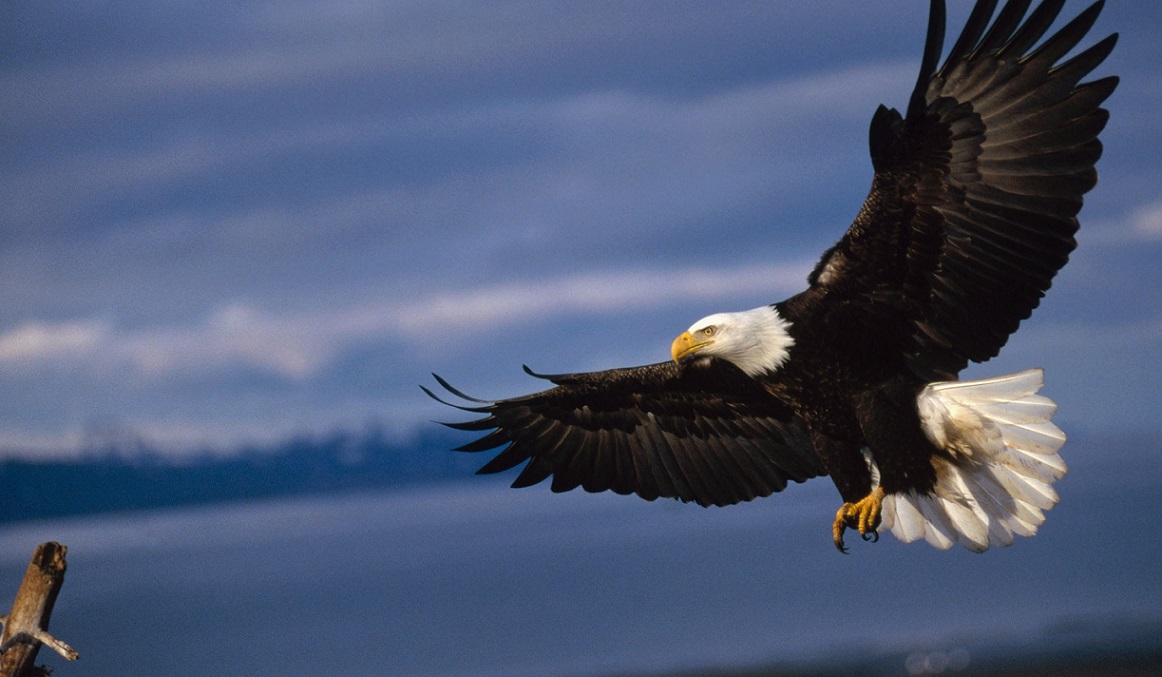Veterans Day
by Roy E. Peterson
It matters not where wars are fought,
What matters is what blood has bought.
It matters not where weapons thrust.
What matters is that it is just.
It matters not where be the foe.
What matters is the heart to go.
These men had hopes for higher things,
For future fame, for wedding rings.
They lived and breathed like everyone,
Yet stayed to fight till victory’s won.
They gave their all like brave men will.
They fought the fight that goes on still.
Not all returned for some all gave,
And lie unmarked in foreign grave.
They may be missing in the war,
But they are all accounted for:
In that great roll call they will stay,
And stand with us on Veterans Day.
Roy E. Peterson is a writer and former U.S. military army intelligence officer who currently resides in Texas.
Glory Glimpsed
by T.M. Moore
I glimpsed it high above—the bright white head,
gold beak, and strong, majestic wings outspread—
as, gliding effortlessly on a breeze,
it soared beyond a distant stand of trees,
and then was gone. A patriotic rush
coursed through my soul, reducing to a hush
all outward sounds, and lighting up my mind
with images of former days, the kind
I might have come across in some old grade
school book, or seen held high in a parade,
or on the presidential seal—the threat
of war, the hope of peace, the visage set
in strength and pride, resolved for freedom. I
heard all those rousing marches, saw the sky
lit up with fireworks and that tattered flag
still flying, knowing that there’s never brag
nor boast among this humble people. And
I thanked God for this very special land
and all her people and achievements. As
the eagle disappeared, I wondered, “Has
our glory likewise faded? Was it ever
more than a wish or hope, and will we never
attain the greatness represented by
that soaring bird, there high up in the sky?”
But, in the long run, does it matter? Should
we care? Or are such noble longings good
enough, though not quite real? So shall we drift
off history’s pages, lacking any Lift
to let us soar? And must the nation’s story
be just one disappearing glimpse of glory?
T.M. Moore’s poetry has appeared in numerous journals, and he has published five volumes of verse through his ministry’s imprint, Waxed Tablet Publications. He is Principal of The Fellowship of Ailbe. He and his wife, Susie, reside in Essex Junction, VT.















Mr. Peterson —
Though somber, a well-written and reflective poem, filled with many memorable lines.
Mr. Moore –
The eagle is indeed both a noble and a terrifying bird, and a fit symbol for our nation.
In the poem, there is one line that does not sit well with me. That is line three, as follows:
Line 3
as, gliding effortLESSly on a breeze
You have made it work at the expense of mispronouncing the word effortlessly — with the emphasis on the third syllable., when it is normally pronounced as Effortlessly.
This mars an otherwise thought-provoking poem.
I suggest:
As gliding through the heavens on a breeze
This is only a suggestion; it doesn’t have to be my version, but please, change it.
Incidentally, my father was waiting on the dock to be shipped to France when the WWI Armistice was announced; otherwise I might not be here.
Thanks to both of you gentlemen for caring about the spirit of our country.
The word is deliberately chosen because to say it one has to slow down, and thus engage somewhat the bird’s glide. The secondary emphasis of -less- serves the need of the iambic foot. Thanks for the kind words and suggestion, but I will leave it as is.
T.M., yes, since “-less-” is sandwiched between two completely unstressed syllables (“-fort-” & “-ly”), it is somewhat automatically promoted (by the ear and as a pro forma matter) to a stressed syllable. Such accommodations to meter are very common in iambic and anapestic lines.
Bless you, Sally! We are indebted to such men as your father who were willing to brave battle for us all.
Bless you, Sally! We are indebted to those such as your father who were willing to go into the unknown for an uncertain fate.
Thank you. He was in the air force when it was still the army air corps. Traveled all over, from Texa to Long Island, made many friends. He would not have missed it for the world.
Later, at the start of WWII, he tried to volunteer, but they said he was too old — he was heartbroken.
it one has to slow down, and thus engage somewhat the bird’s glide. The secondary emphasis of -less- serves the need of the iambic foot. Thanks for the kind words and suggestion, but I will leave it as
The best of us who practice what we preach
To sacrifice war for democracy,
Doth know that verbally abusive speech
Displays the worst of all illiteracy.
Illiteracy is cut from the same cloth
As those who misuse older words like “Doth.”
Indeed, Joseph, the third person singular present of “do” is not what is called for here.
Also, “To sacrifice war for democracy,” doesn’t quite mean what I think the writer intended. I think what was intended was something more like:
To suffer war for democracy.
One may sacrifice lives, but I’ll be damned if I can figure out what it means “to sacrifice war.”